
Creedence Clearwater Revival, commonly abbreviated as CCR or simply Creedence, was an American rock band formed in El Cerrito, California. The band consisted of lead vocalist, lead guitarist, and primary songwriter John Fogerty, his brother, rhythm guitarist Tom Fogerty, bassist Stu Cook, and drummer Doug Clifford. These members had played together since 1959, first as the Blue Velvets and later as the Golliwogs, before settling on Creedence Clearwater Revival in 1967. The band's most prolific and successful period between 1969 and 1971 produced fourteen consecutive Top 10 singles and five consecutive Top 10 albums in the United States, two of which – Green River (1969) and Cosmo's Factory (1970) – topped the Billboard 200 chart. The band performed at the 1969 Woodstock festival in Upstate New York, and was the first major act signed to appear there.

Cosmo's Factory is the fifth studio album by the American rock band Creedence Clearwater Revival, released by Fantasy Records on July 16, 1970. Six of the album's eleven tracks were released as singles in 1970, and all of them charted in the top 5 of the Billboard Hot 100. The album spent nine consecutive weeks in the number one position on the Billboard 200 chart and was certified 4x platinum by the Recording Industry Association of America (RIAA) in 1990. Rolling Stone ranked it number 413 on its 2020 list of the "500 Greatest Albums of All Time".

Creedence Clearwater Revival is the debut studio album by the American rock band Creedence Clearwater Revival, released in July 1968, by Fantasy Records in the US. Featuring the band's first hit single, "Susie Q", which reached number 11 in the US charts, it was recorded shortly after the band changed its name from the Golliwogs and began developing a signature swamp rock sound.
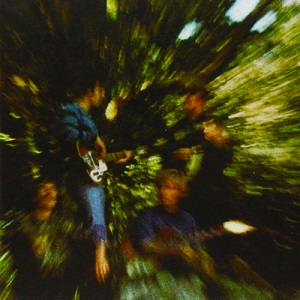
Bayou Country is the second studio album by the American rock band Creedence Clearwater Revival, released by Fantasy Records on January 15, 1969, and was the first of three albums CCR released in that year. Bayou Country reached number 7 on the Billboard 200 chart and produced the band's first No. 2 hit single, "Proud Mary".
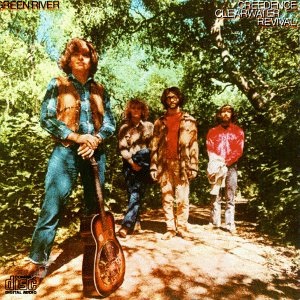
Green River is the third studio album by the American rock band Creedence Clearwater Revival, released on August 7, 1969 by Fantasy Records. It was the second of three albums they released in that year, preceded by Bayou Country in January and followed by Willy and the Poor Boys in October.
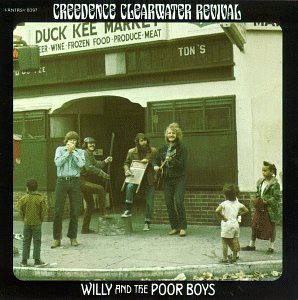
Willy and the Poor Boys is the fourth studio album by the American rock band Creedence Clearwater Revival, released on October 29, 1969, by Fantasy Records. It was the last of three studio albums the band released that year, arriving just three months after Green River. In 2020, Rolling Stone ranked the album number 193 on its list of the "500 Greatest Albums of All Time".

Mardi Gras is the seventh and final studio album by the American rock band Creedence Clearwater Revival, released on April 11, 1972 by Fantasy Records. Recorded after the departure of guitarist Tom Fogerty, it was the band's only studio album as a trio, and featured songs written, sung, and produced by each of the remaining members, rather than just John Fogerty. The recording sessions were marred by personal and creative tensions, and the group disbanded after a short U.S. tour to support the album.
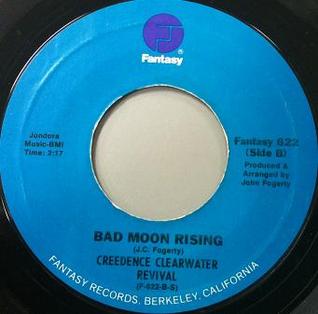
"Bad Moon Rising" is a song written by John Fogerty and performed by Creedence Clearwater Revival. It was the lead single from their album Green River and was released on April 16, 1969 four months before the album. The song peaked at No. 2 on the Billboard Hot 100 chart on 28 June 1969 and reached No. 1 on the UK Singles Chart for three weeks in September of that year. It was CCR's second gold single.

"Travelin' Band" is a song written by John Fogerty and originally recorded by Creedence Clearwater Revival. It was included on their 1970 album Cosmo's Factory. Backed with "Who'll Stop the Rain", it was one of three double sided singles from that album to reach the top five on the U.S. Pop Singles Chart and the first of two to reach the number 2 spot on the American charts, alongside "Lookin' Out My Back Door", in which they were unable to interrupt the six-week run of the successful number one, "Bridge Over Troubled Water" by Simon and Garfunkel. "Travelin' Band" was also a hit in the UK, reaching number eight on the UK Singles Chart.
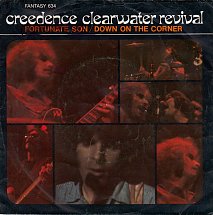
"Fortunate Son" is a song by the American rock band Creedence Clearwater Revival, released on the band's fourth studio album, Willy and the Poor Boys in October 1969. It was previously released as a single, together with "Down on the Corner", in September 1969. It soon became a Vietnam anti-war movement anthem and an expressive symbol of the counterculture's opposition to U.S. military involvement in the Vietnam War and solidarity with the soldiers fighting it. The song has been featured extensively in pop culture depictions of the Vietnam War and the anti-war movement.
Swamp rock is a genre of rock music that originated in the mid-1960s as a fusion of rockabilly and soul music with swamp blues, country music and funk. The genre originated in Louisiana by artists such as Tony Joe White, but was subsequently popularized by California band Creedence Clearwater Revival.

Chronicle, or fully Chronicle: The 20 Greatest Hits, is a greatest hits album by the American rock band Creedence Clearwater Revival. It was released in January 1976 by Fantasy Records. The edited version of "I Heard It Through the Grapevine" featured on the album was simultaneously released as a single.
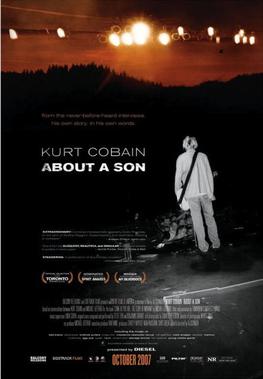
Kurt Cobain: About a Son is a 2006 American documentary film about American rock musician Kurt Cobain, directed by AJ Schnack and produced by Sidetrack Films. It consists of excerpts from the audio recordings journalist Michael Azerrad made of the interviews he conducted with Cobain for the book Come as You Are: The Story of Nirvana, set over ambient cinematography of the places in Washington where Cobain lived, played and worked: Aberdeen, Olympia, and Seattle.

"Have You Ever Seen the Rain" is a song by American rock band Creedence Clearwater Revival, written by John Fogerty and released as a single in 1971 from the album Pendulum (1970). The song charted highest in Canada, reaching number one on the RPM 100 national singles chart in March 1971. In the U.S., in the same year it peaked at number eight on the Billboard Hot 100 singles chart. On the Cash Box pop chart, it peaked at number three. In the UK, it reached number 36. It was the group's eighth gold-selling single. In March 2023, the song surpassed one billion streams on Spotify.

Creedence Country is a compilation album by American rock band Creedence Clearwater Revival (CCR). It was released by Fantasy Records in October 1981 with the purpose of infiltrating the country market.

"Green River" is a song by American rock band Creedence Clearwater Revival. It was written by John Fogerty and released as a single in July 1969, one month before the album of the same name was released. "Green River" peaked at number two for one week, behind "Sugar, Sugar" by The Archies, and was ranked by Billboard as the No. 31 song of 1969.
Sweet Thing was a Canadian alternative rock band based in Toronto who have been signed to EMI Music Canada since 2008. They are best known for their singles "Dance Mother" and "Change of Seasons".
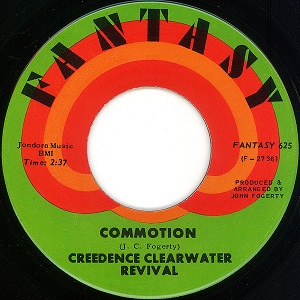
"Commotion" is a song by Creedence Clearwater Revival from the album Green River, and was also the B-side of the single release of the album's title track. In 1980, "Tombstone Shadow" b/w "Commotion'" was released as a single in the United States. While released as a B-side, "Commotion" reached #30 in the United States on the Billboard Hot 100 and #16 in Germany. It was written by John Fogerty and recorded at Wally Heider's Studios in San Francisco in June 1969. The 45rpm was the debut session of the band at Wally Heider's and the first collaboration with engineer Russ Gary.
"Don't Look Now " is a song written by John Fogerty that was first released on Creedence Clearwater Revival's 1969 album Willy and the Poor Boys. It has also appeared on several of the group's live and compilation albums. It was covered by Minutemen on their 1984 album Double Nickels on the Dime.















